Business Environment Report: Analysis of Iceland's Business Activities
VerifiedAdded on 2020/06/03
|13
|4023
|31
Report
AI Summary
This report provides a comprehensive analysis of the business environment impacting Iceland, a UK-based retail sector organization. The report begins by outlining different types of organizations, including their structures, missions, and visions. It then delves into the functional departments within Iceland, such as human resources, marketing, customer service, sales, accounting, and administrative departments, highlighting how these departments are linked to the organization's objectives and structure. A significant portion of the report is dedicated to a PESTLE analysis, evaluating the political, economic, social, technological, legal, and environmental factors affecting Iceland's performance. Furthermore, the report examines the impact of both internal and external environmental factors on decision-making processes within the company. It also incorporates a SWOT analysis, exploring the interrelationship between strengths, weaknesses, opportunities, and threats, and how these relate to macro factors influencing Iceland's operations. The report concludes by summarizing the key findings and their implications for Iceland's business strategies. This report is a valuable resource for understanding the complexities of the business environment and its impact on retail organizations.
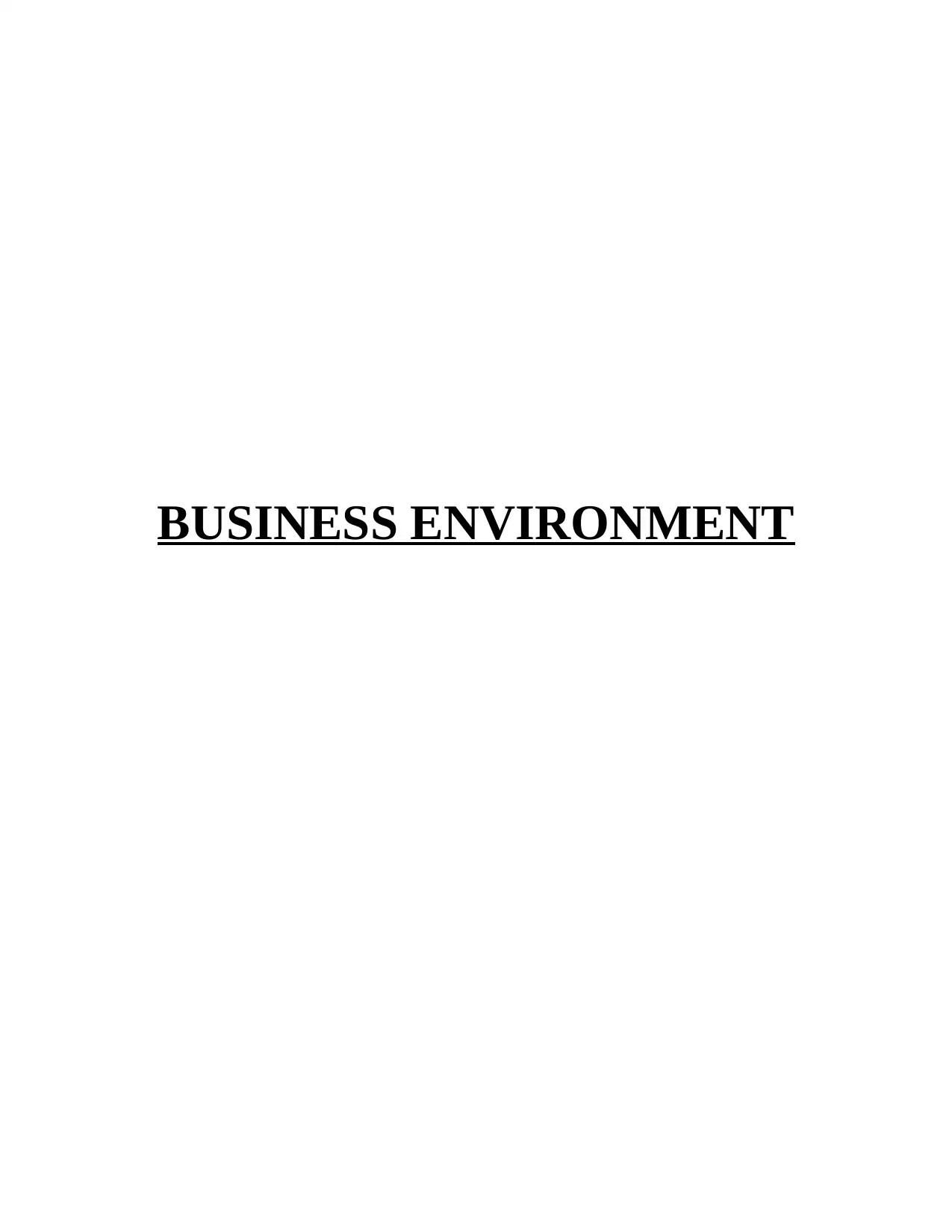
BUSINESS ENVIRONMENT
Paraphrase This Document
Need a fresh take? Get an instant paraphrase of this document with our AI Paraphraser
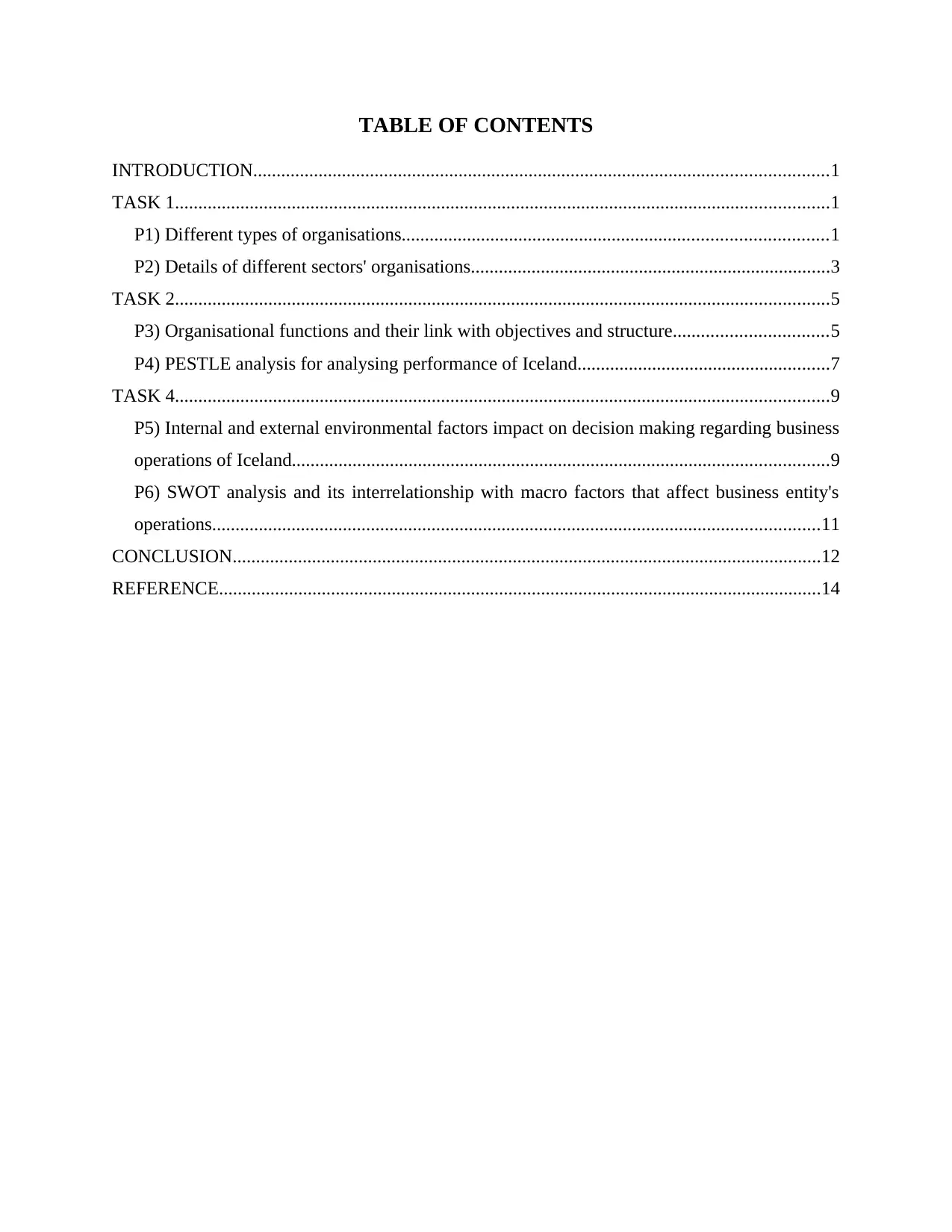
TABLE OF CONTENTS
INTRODUCTION...........................................................................................................................1
TASK 1............................................................................................................................................1
P1) Different types of organisations...........................................................................................1
P2) Details of different sectors' organisations.............................................................................3
TASK 2............................................................................................................................................5
P3) Organisational functions and their link with objectives and structure.................................5
P4) PESTLE analysis for analysing performance of Iceland......................................................7
TASK 4............................................................................................................................................9
P5) Internal and external environmental factors impact on decision making regarding business
operations of Iceland...................................................................................................................9
P6) SWOT analysis and its interrelationship with macro factors that affect business entity's
operations..................................................................................................................................11
CONCLUSION..............................................................................................................................12
REFERENCE.................................................................................................................................14
INTRODUCTION...........................................................................................................................1
TASK 1............................................................................................................................................1
P1) Different types of organisations...........................................................................................1
P2) Details of different sectors' organisations.............................................................................3
TASK 2............................................................................................................................................5
P3) Organisational functions and their link with objectives and structure.................................5
P4) PESTLE analysis for analysing performance of Iceland......................................................7
TASK 4............................................................................................................................................9
P5) Internal and external environmental factors impact on decision making regarding business
operations of Iceland...................................................................................................................9
P6) SWOT analysis and its interrelationship with macro factors that affect business entity's
operations..................................................................................................................................11
CONCLUSION..............................................................................................................................12
REFERENCE.................................................................................................................................14
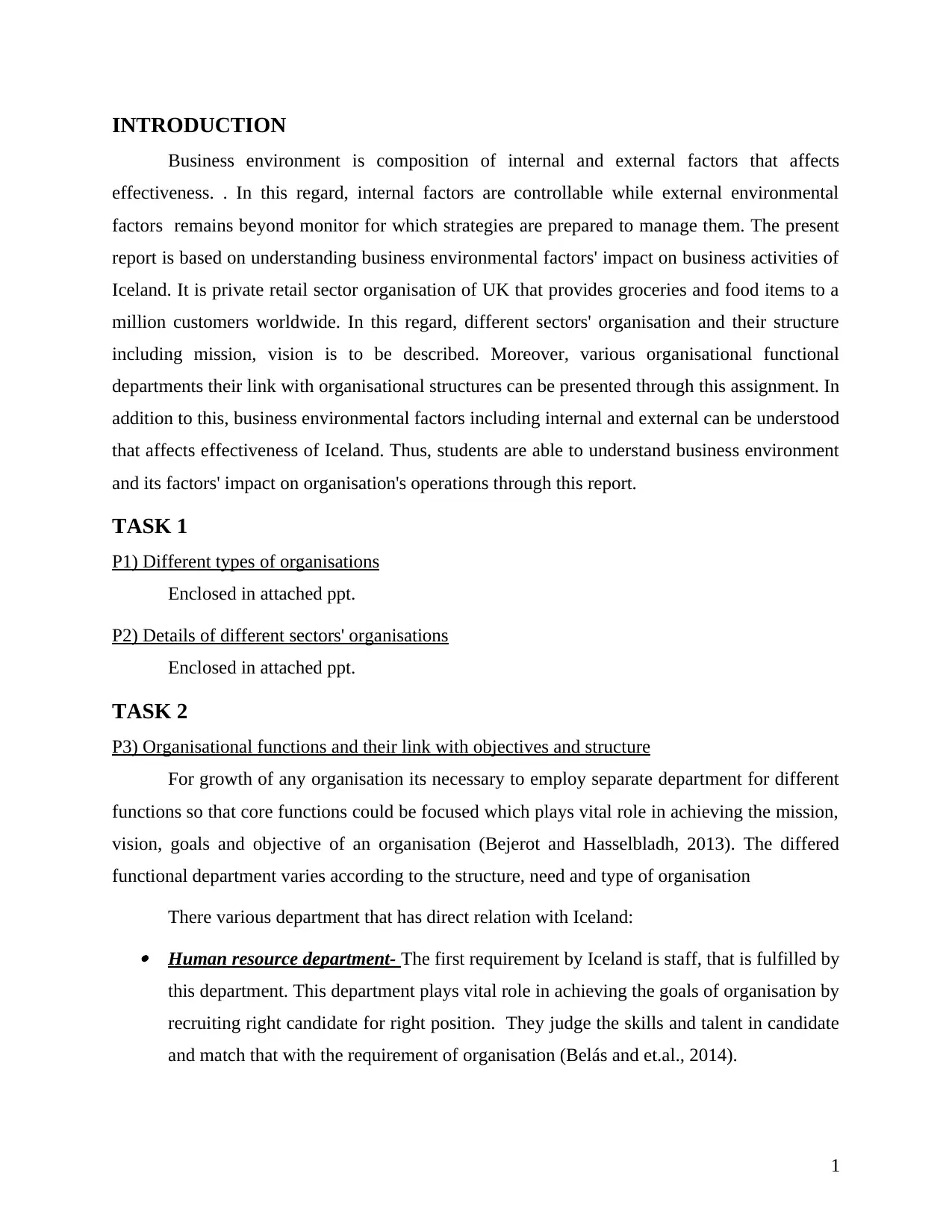
INTRODUCTION
Business environment is composition of internal and external factors that affects
effectiveness. . In this regard, internal factors are controllable while external environmental
factors remains beyond monitor for which strategies are prepared to manage them. The present
report is based on understanding business environmental factors' impact on business activities of
Iceland. It is private retail sector organisation of UK that provides groceries and food items to a
million customers worldwide. In this regard, different sectors' organisation and their structure
including mission, vision is to be described. Moreover, various organisational functional
departments their link with organisational structures can be presented through this assignment. In
addition to this, business environmental factors including internal and external can be understood
that affects effectiveness of Iceland. Thus, students are able to understand business environment
and its factors' impact on organisation's operations through this report.
TASK 1
P1) Different types of organisations
Enclosed in attached ppt.
P2) Details of different sectors' organisations
Enclosed in attached ppt.
TASK 2
P3) Organisational functions and their link with objectives and structure
For growth of any organisation its necessary to employ separate department for different
functions so that core functions could be focused which plays vital role in achieving the mission,
vision, goals and objective of an organisation (Bejerot and Hasselbladh, 2013). The differed
functional department varies according to the structure, need and type of organisation
There various department that has direct relation with Iceland: Human resource department- The first requirement by Iceland is staff, that is fulfilled by
this department. This department plays vital role in achieving the goals of organisation by
recruiting right candidate for right position. They judge the skills and talent in candidate
and match that with the requirement of organisation (Belás and et.al., 2014).
1
Business environment is composition of internal and external factors that affects
effectiveness. . In this regard, internal factors are controllable while external environmental
factors remains beyond monitor for which strategies are prepared to manage them. The present
report is based on understanding business environmental factors' impact on business activities of
Iceland. It is private retail sector organisation of UK that provides groceries and food items to a
million customers worldwide. In this regard, different sectors' organisation and their structure
including mission, vision is to be described. Moreover, various organisational functional
departments their link with organisational structures can be presented through this assignment. In
addition to this, business environmental factors including internal and external can be understood
that affects effectiveness of Iceland. Thus, students are able to understand business environment
and its factors' impact on organisation's operations through this report.
TASK 1
P1) Different types of organisations
Enclosed in attached ppt.
P2) Details of different sectors' organisations
Enclosed in attached ppt.
TASK 2
P3) Organisational functions and their link with objectives and structure
For growth of any organisation its necessary to employ separate department for different
functions so that core functions could be focused which plays vital role in achieving the mission,
vision, goals and objective of an organisation (Bejerot and Hasselbladh, 2013). The differed
functional department varies according to the structure, need and type of organisation
There various department that has direct relation with Iceland: Human resource department- The first requirement by Iceland is staff, that is fulfilled by
this department. This department plays vital role in achieving the goals of organisation by
recruiting right candidate for right position. They judge the skills and talent in candidate
and match that with the requirement of organisation (Belás and et.al., 2014).
1
⊘ This is a preview!⊘
Do you want full access?
Subscribe today to unlock all pages.

Trusted by 1+ million students worldwide
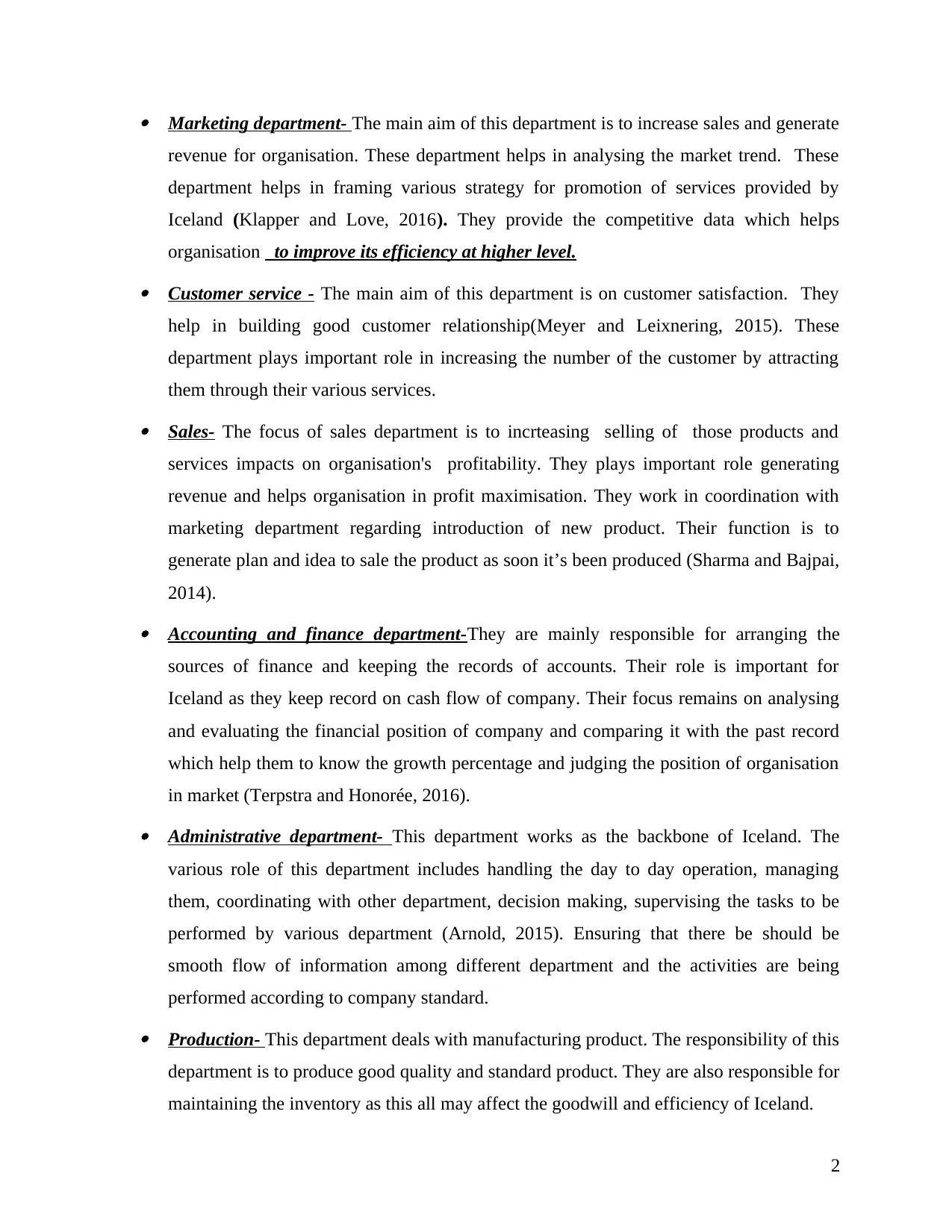
Marketing department- The main aim of this department is to increase sales and generate
revenue for organisation. These department helps in analysing the market trend. These
department helps in framing various strategy for promotion of services provided by
Iceland (Klapper and Love, 2016). They provide the competitive data which helps
organisation to improve its efficiency at higher level. Customer service - The main aim of this department is on customer satisfaction. They
help in building good customer relationship(Meyer and Leixnering, 2015). These
department plays important role in increasing the number of the customer by attracting
them through their various services. Sales- The focus of sales department is to incrteasing selling of those products and
services impacts on organisation's profitability. They plays important role generating
revenue and helps organisation in profit maximisation. They work in coordination with
marketing department regarding introduction of new product. Their function is to
generate plan and idea to sale the product as soon it’s been produced (Sharma and Bajpai,
2014). Accounting and finance department-They are mainly responsible for arranging the
sources of finance and keeping the records of accounts. Their role is important for
Iceland as they keep record on cash flow of company. Their focus remains on analysing
and evaluating the financial position of company and comparing it with the past record
which help them to know the growth percentage and judging the position of organisation
in market (Terpstra and Honorée, 2016). Administrative department- This department works as the backbone of Iceland. The
various role of this department includes handling the day to day operation, managing
them, coordinating with other department, decision making, supervising the tasks to be
performed by various department (Arnold, 2015). Ensuring that there be should be
smooth flow of information among different department and the activities are being
performed according to company standard. Production- This department deals with manufacturing product. The responsibility of this
department is to produce good quality and standard product. They are also responsible for
maintaining the inventory as this all may affect the goodwill and efficiency of Iceland.
2
revenue for organisation. These department helps in analysing the market trend. These
department helps in framing various strategy for promotion of services provided by
Iceland (Klapper and Love, 2016). They provide the competitive data which helps
organisation to improve its efficiency at higher level. Customer service - The main aim of this department is on customer satisfaction. They
help in building good customer relationship(Meyer and Leixnering, 2015). These
department plays important role in increasing the number of the customer by attracting
them through their various services. Sales- The focus of sales department is to incrteasing selling of those products and
services impacts on organisation's profitability. They plays important role generating
revenue and helps organisation in profit maximisation. They work in coordination with
marketing department regarding introduction of new product. Their function is to
generate plan and idea to sale the product as soon it’s been produced (Sharma and Bajpai,
2014). Accounting and finance department-They are mainly responsible for arranging the
sources of finance and keeping the records of accounts. Their role is important for
Iceland as they keep record on cash flow of company. Their focus remains on analysing
and evaluating the financial position of company and comparing it with the past record
which help them to know the growth percentage and judging the position of organisation
in market (Terpstra and Honorée, 2016). Administrative department- This department works as the backbone of Iceland. The
various role of this department includes handling the day to day operation, managing
them, coordinating with other department, decision making, supervising the tasks to be
performed by various department (Arnold, 2015). Ensuring that there be should be
smooth flow of information among different department and the activities are being
performed according to company standard. Production- This department deals with manufacturing product. The responsibility of this
department is to produce good quality and standard product. They are also responsible for
maintaining the inventory as this all may affect the goodwill and efficiency of Iceland.
2
Paraphrase This Document
Need a fresh take? Get an instant paraphrase of this document with our AI Paraphraser
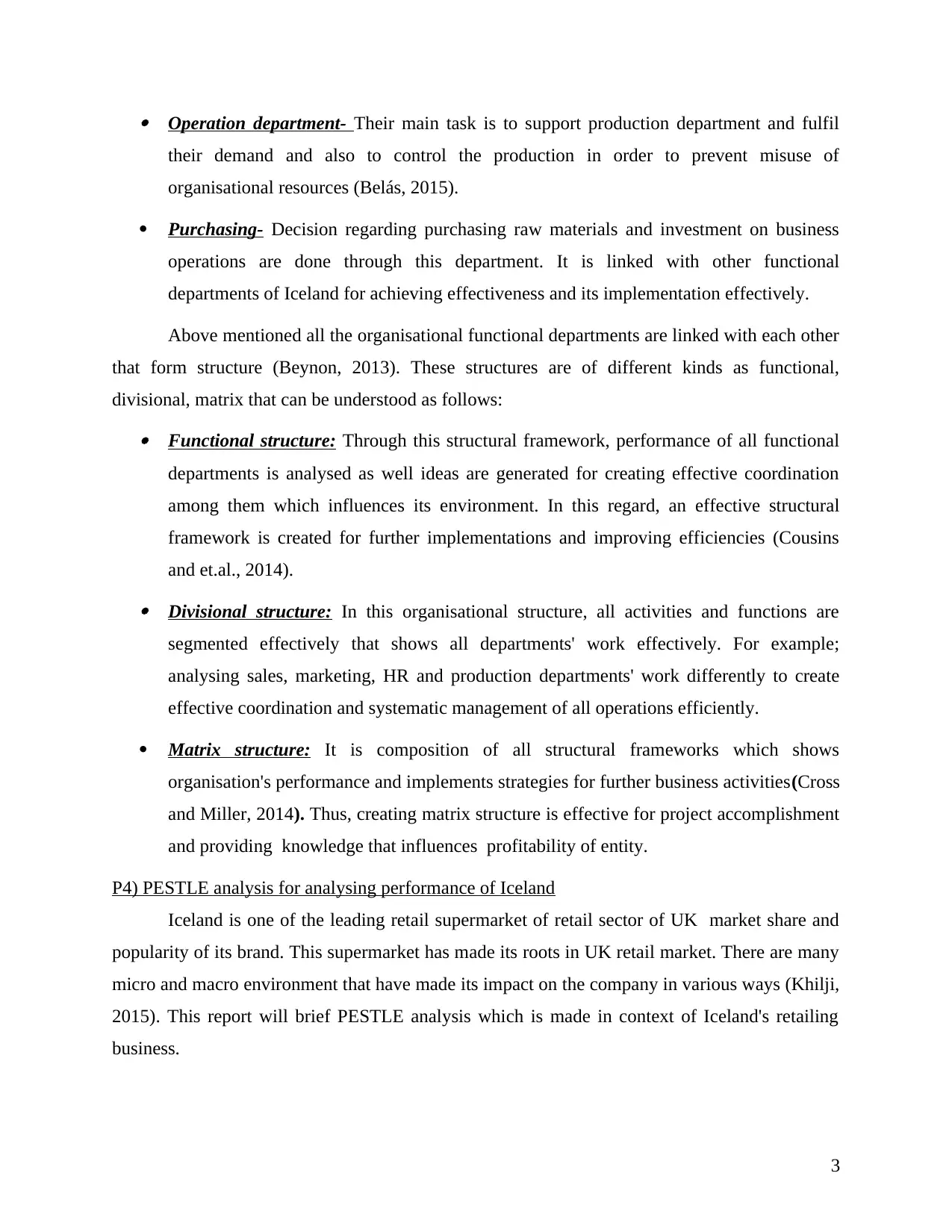
Operation department- Their main task is to support production department and fulfil
their demand and also to control the production in order to prevent misuse of
organisational resources (Belás, 2015).
Purchasing- Decision regarding purchasing raw materials and investment on business
operations are done through this department. It is linked with other functional
departments of Iceland for achieving effectiveness and its implementation effectively.
Above mentioned all the organisational functional departments are linked with each other
that form structure (Beynon, 2013). These structures are of different kinds as functional,
divisional, matrix that can be understood as follows: Functional structure: Through this structural framework, performance of all functional
departments is analysed as well ideas are generated for creating effective coordination
among them which influences its environment. In this regard, an effective structural
framework is created for further implementations and improving efficiencies (Cousins
and et.al., 2014). Divisional structure: In this organisational structure, all activities and functions are
segmented effectively that shows all departments' work effectively. For example;
analysing sales, marketing, HR and production departments' work differently to create
effective coordination and systematic management of all operations efficiently.
Matrix structure: It is composition of all structural frameworks which shows
organisation's performance and implements strategies for further business activities(Cross
and Miller, 2014). Thus, creating matrix structure is effective for project accomplishment
and providing knowledge that influences profitability of entity.
P4) PESTLE analysis for analysing performance of Iceland
Iceland is one of the leading retail supermarket of retail sector of UK market share and
popularity of its brand. This supermarket has made its roots in UK retail market. There are many
micro and macro environment that have made its impact on the company in various ways (Khilji,
2015). This report will brief PESTLE analysis which is made in context of Iceland's retailing
business.
3
their demand and also to control the production in order to prevent misuse of
organisational resources (Belás, 2015).
Purchasing- Decision regarding purchasing raw materials and investment on business
operations are done through this department. It is linked with other functional
departments of Iceland for achieving effectiveness and its implementation effectively.
Above mentioned all the organisational functional departments are linked with each other
that form structure (Beynon, 2013). These structures are of different kinds as functional,
divisional, matrix that can be understood as follows: Functional structure: Through this structural framework, performance of all functional
departments is analysed as well ideas are generated for creating effective coordination
among them which influences its environment. In this regard, an effective structural
framework is created for further implementations and improving efficiencies (Cousins
and et.al., 2014). Divisional structure: In this organisational structure, all activities and functions are
segmented effectively that shows all departments' work effectively. For example;
analysing sales, marketing, HR and production departments' work differently to create
effective coordination and systematic management of all operations efficiently.
Matrix structure: It is composition of all structural frameworks which shows
organisation's performance and implements strategies for further business activities(Cross
and Miller, 2014). Thus, creating matrix structure is effective for project accomplishment
and providing knowledge that influences profitability of entity.
P4) PESTLE analysis for analysing performance of Iceland
Iceland is one of the leading retail supermarket of retail sector of UK market share and
popularity of its brand. This supermarket has made its roots in UK retail market. There are many
micro and macro environment that have made its impact on the company in various ways (Khilji,
2015). This report will brief PESTLE analysis which is made in context of Iceland's retailing
business.
3
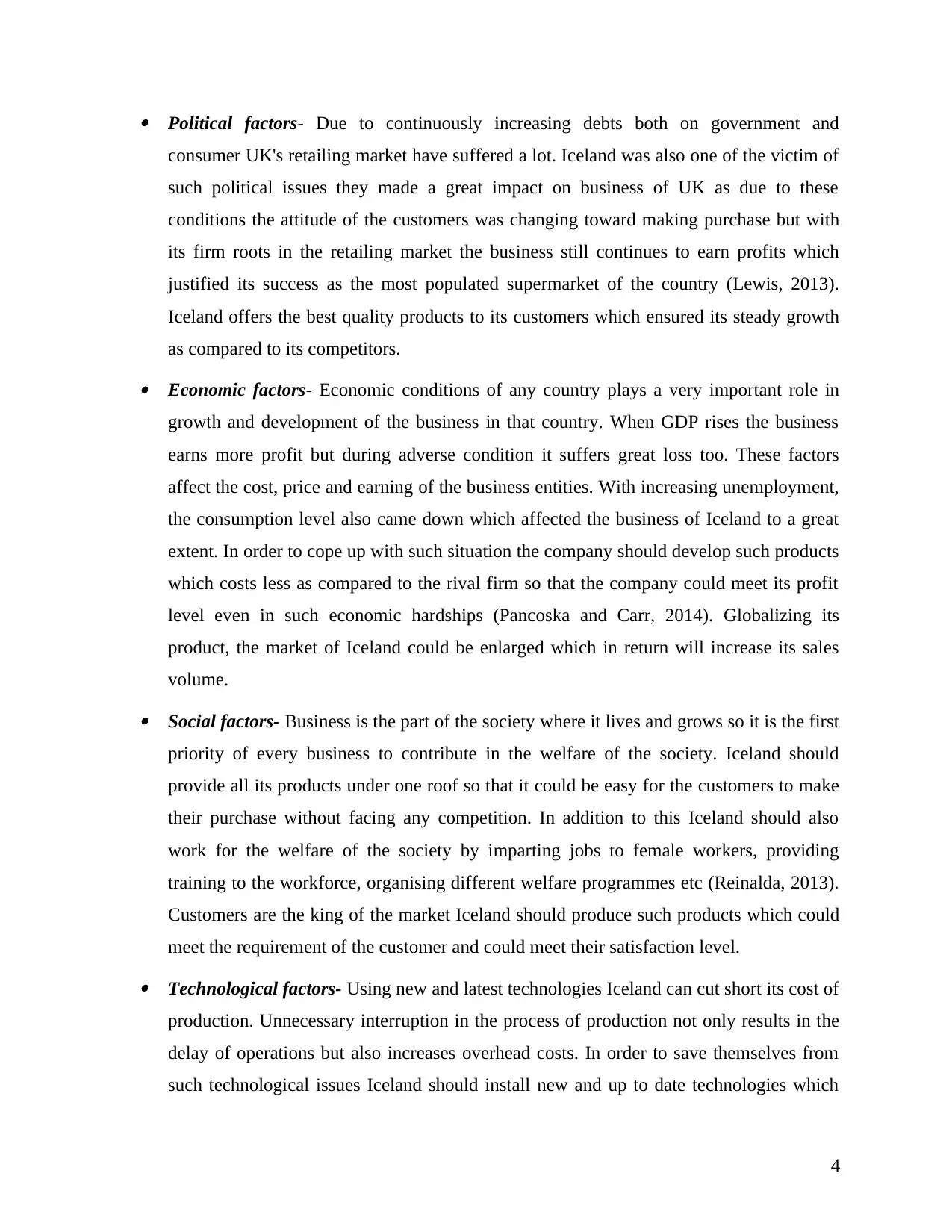
Political factors- Due to continuously increasing debts both on government and
consumer UK's retailing market have suffered a lot. Iceland was also one of the victim of
such political issues they made a great impact on business of UK as due to these
conditions the attitude of the customers was changing toward making purchase but with
its firm roots in the retailing market the business still continues to earn profits which
justified its success as the most populated supermarket of the country (Lewis, 2013).
Iceland offers the best quality products to its customers which ensured its steady growth
as compared to its competitors. Economic factors- Economic conditions of any country plays a very important role in
growth and development of the business in that country. When GDP rises the business
earns more profit but during adverse condition it suffers great loss too. These factors
affect the cost, price and earning of the business entities. With increasing unemployment,
the consumption level also came down which affected the business of Iceland to a great
extent. In order to cope up with such situation the company should develop such products
which costs less as compared to the rival firm so that the company could meet its profit
level even in such economic hardships (Pancoska and Carr, 2014). Globalizing its
product, the market of Iceland could be enlarged which in return will increase its sales
volume. Social factors- Business is the part of the society where it lives and grows so it is the first
priority of every business to contribute in the welfare of the society. Iceland should
provide all its products under one roof so that it could be easy for the customers to make
their purchase without facing any competition. In addition to this Iceland should also
work for the welfare of the society by imparting jobs to female workers, providing
training to the workforce, organising different welfare programmes etc (Reinalda, 2013).
Customers are the king of the market Iceland should produce such products which could
meet the requirement of the customer and could meet their satisfaction level. Technological factors- Using new and latest technologies Iceland can cut short its cost of
production. Unnecessary interruption in the process of production not only results in the
delay of operations but also increases overhead costs. In order to save themselves from
such technological issues Iceland should install new and up to date technologies which
4
consumer UK's retailing market have suffered a lot. Iceland was also one of the victim of
such political issues they made a great impact on business of UK as due to these
conditions the attitude of the customers was changing toward making purchase but with
its firm roots in the retailing market the business still continues to earn profits which
justified its success as the most populated supermarket of the country (Lewis, 2013).
Iceland offers the best quality products to its customers which ensured its steady growth
as compared to its competitors. Economic factors- Economic conditions of any country plays a very important role in
growth and development of the business in that country. When GDP rises the business
earns more profit but during adverse condition it suffers great loss too. These factors
affect the cost, price and earning of the business entities. With increasing unemployment,
the consumption level also came down which affected the business of Iceland to a great
extent. In order to cope up with such situation the company should develop such products
which costs less as compared to the rival firm so that the company could meet its profit
level even in such economic hardships (Pancoska and Carr, 2014). Globalizing its
product, the market of Iceland could be enlarged which in return will increase its sales
volume. Social factors- Business is the part of the society where it lives and grows so it is the first
priority of every business to contribute in the welfare of the society. Iceland should
provide all its products under one roof so that it could be easy for the customers to make
their purchase without facing any competition. In addition to this Iceland should also
work for the welfare of the society by imparting jobs to female workers, providing
training to the workforce, organising different welfare programmes etc (Reinalda, 2013).
Customers are the king of the market Iceland should produce such products which could
meet the requirement of the customer and could meet their satisfaction level. Technological factors- Using new and latest technologies Iceland can cut short its cost of
production. Unnecessary interruption in the process of production not only results in the
delay of operations but also increases overhead costs. In order to save themselves from
such technological issues Iceland should install new and up to date technologies which
4
⊘ This is a preview!⊘
Do you want full access?
Subscribe today to unlock all pages.

Trusted by 1+ million students worldwide
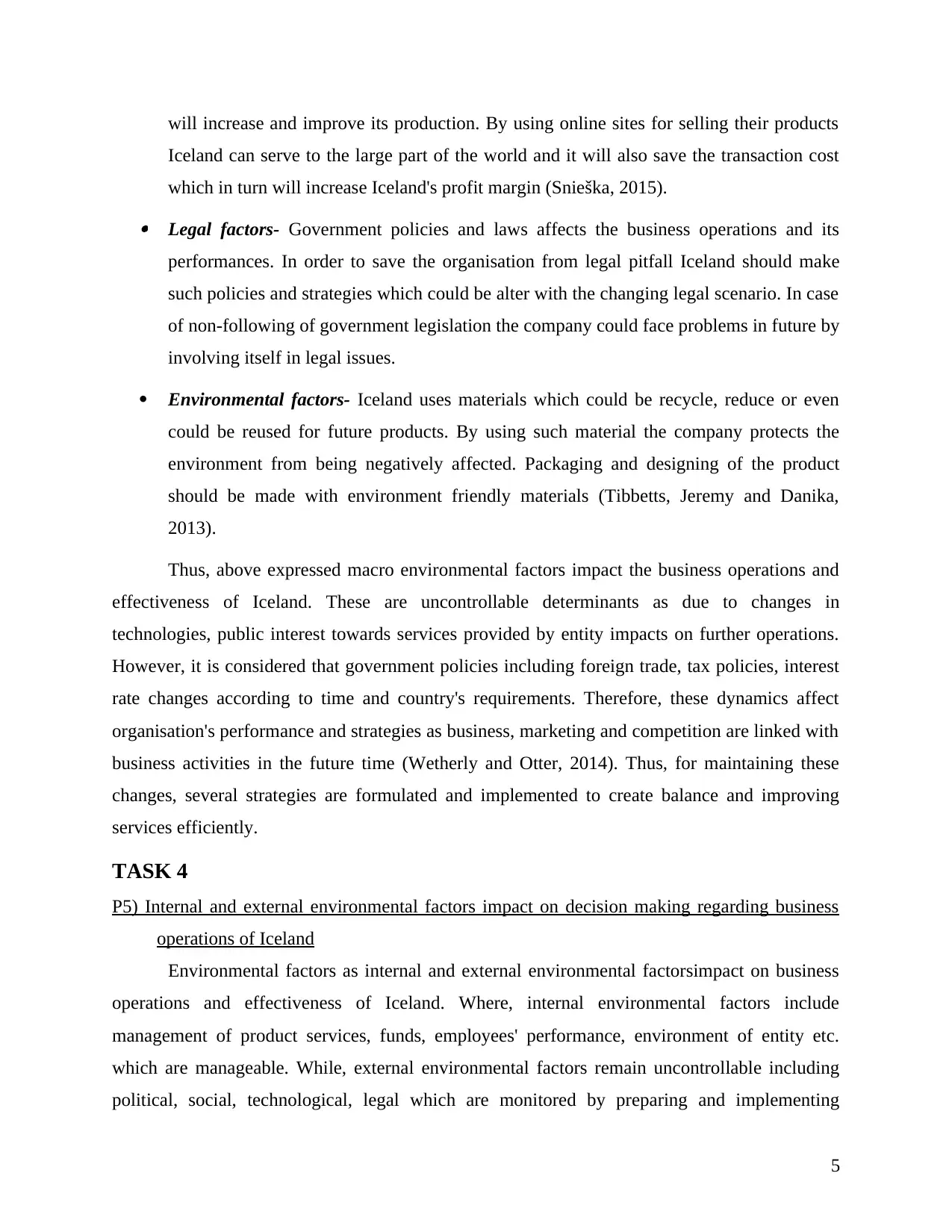
will increase and improve its production. By using online sites for selling their products
Iceland can serve to the large part of the world and it will also save the transaction cost
which in turn will increase Iceland's profit margin (Snieška, 2015). Legal factors- Government policies and laws affects the business operations and its
performances. In order to save the organisation from legal pitfall Iceland should make
such policies and strategies which could be alter with the changing legal scenario. In case
of non-following of government legislation the company could face problems in future by
involving itself in legal issues.
Environmental factors- Iceland uses materials which could be recycle, reduce or even
could be reused for future products. By using such material the company protects the
environment from being negatively affected. Packaging and designing of the product
should be made with environment friendly materials (Tibbetts, Jeremy and Danika,
2013).
Thus, above expressed macro environmental factors impact the business operations and
effectiveness of Iceland. These are uncontrollable determinants as due to changes in
technologies, public interest towards services provided by entity impacts on further operations.
However, it is considered that government policies including foreign trade, tax policies, interest
rate changes according to time and country's requirements. Therefore, these dynamics affect
organisation's performance and strategies as business, marketing and competition are linked with
business activities in the future time (Wetherly and Otter, 2014). Thus, for maintaining these
changes, several strategies are formulated and implemented to create balance and improving
services efficiently.
TASK 4
P5) Internal and external environmental factors impact on decision making regarding business
operations of Iceland
Environmental factors as internal and external environmental factorsimpact on business
operations and effectiveness of Iceland. Where, internal environmental factors include
management of product services, funds, employees' performance, environment of entity etc.
which are manageable. While, external environmental factors remain uncontrollable including
political, social, technological, legal which are monitored by preparing and implementing
5
Iceland can serve to the large part of the world and it will also save the transaction cost
which in turn will increase Iceland's profit margin (Snieška, 2015). Legal factors- Government policies and laws affects the business operations and its
performances. In order to save the organisation from legal pitfall Iceland should make
such policies and strategies which could be alter with the changing legal scenario. In case
of non-following of government legislation the company could face problems in future by
involving itself in legal issues.
Environmental factors- Iceland uses materials which could be recycle, reduce or even
could be reused for future products. By using such material the company protects the
environment from being negatively affected. Packaging and designing of the product
should be made with environment friendly materials (Tibbetts, Jeremy and Danika,
2013).
Thus, above expressed macro environmental factors impact the business operations and
effectiveness of Iceland. These are uncontrollable determinants as due to changes in
technologies, public interest towards services provided by entity impacts on further operations.
However, it is considered that government policies including foreign trade, tax policies, interest
rate changes according to time and country's requirements. Therefore, these dynamics affect
organisation's performance and strategies as business, marketing and competition are linked with
business activities in the future time (Wetherly and Otter, 2014). Thus, for maintaining these
changes, several strategies are formulated and implemented to create balance and improving
services efficiently.
TASK 4
P5) Internal and external environmental factors impact on decision making regarding business
operations of Iceland
Environmental factors as internal and external environmental factorsimpact on business
operations and effectiveness of Iceland. Where, internal environmental factors include
management of product services, funds, employees' performance, environment of entity etc.
which are manageable. While, external environmental factors remain uncontrollable including
political, social, technological, legal which are monitored by preparing and implementing
5
Paraphrase This Document
Need a fresh take? Get an instant paraphrase of this document with our AI Paraphraser
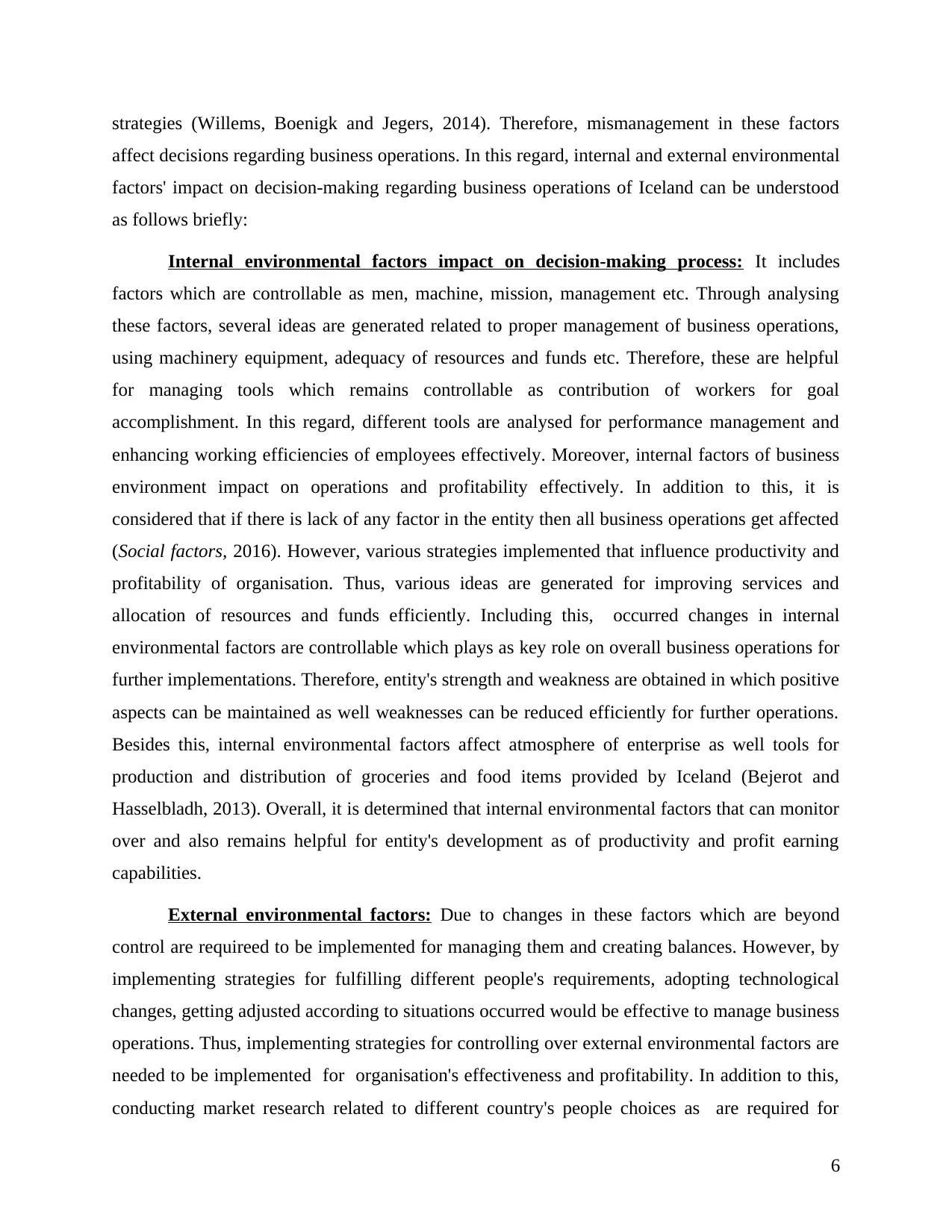
strategies (Willems, Boenigk and Jegers, 2014). Therefore, mismanagement in these factors
affect decisions regarding business operations. In this regard, internal and external environmental
factors' impact on decision-making regarding business operations of Iceland can be understood
as follows briefly:
Internal environmental factors impact on decision-making process: It includes
factors which are controllable as men, machine, mission, management etc. Through analysing
these factors, several ideas are generated related to proper management of business operations,
using machinery equipment, adequacy of resources and funds etc. Therefore, these are helpful
for managing tools which remains controllable as contribution of workers for goal
accomplishment. In this regard, different tools are analysed for performance management and
enhancing working efficiencies of employees effectively. Moreover, internal factors of business
environment impact on operations and profitability effectively. In addition to this, it is
considered that if there is lack of any factor in the entity then all business operations get affected
(Social factors, 2016). However, various strategies implemented that influence productivity and
profitability of organisation. Thus, various ideas are generated for improving services and
allocation of resources and funds efficiently. Including this, occurred changes in internal
environmental factors are controllable which plays as key role on overall business operations for
further implementations. Therefore, entity's strength and weakness are obtained in which positive
aspects can be maintained as well weaknesses can be reduced efficiently for further operations.
Besides this, internal environmental factors affect atmosphere of enterprise as well tools for
production and distribution of groceries and food items provided by Iceland (Bejerot and
Hasselbladh, 2013). Overall, it is determined that internal environmental factors that can monitor
over and also remains helpful for entity's development as of productivity and profit earning
capabilities.
External environmental factors: Due to changes in these factors which are beyond
control are requireed to be implemented for managing them and creating balances. However, by
implementing strategies for fulfilling different people's requirements, adopting technological
changes, getting adjusted according to situations occurred would be effective to manage business
operations. Thus, implementing strategies for controlling over external environmental factors are
needed to be implemented for organisation's effectiveness and profitability. In addition to this,
conducting market research related to different country's people choices as are required for
6
affect decisions regarding business operations. In this regard, internal and external environmental
factors' impact on decision-making regarding business operations of Iceland can be understood
as follows briefly:
Internal environmental factors impact on decision-making process: It includes
factors which are controllable as men, machine, mission, management etc. Through analysing
these factors, several ideas are generated related to proper management of business operations,
using machinery equipment, adequacy of resources and funds etc. Therefore, these are helpful
for managing tools which remains controllable as contribution of workers for goal
accomplishment. In this regard, different tools are analysed for performance management and
enhancing working efficiencies of employees effectively. Moreover, internal factors of business
environment impact on operations and profitability effectively. In addition to this, it is
considered that if there is lack of any factor in the entity then all business operations get affected
(Social factors, 2016). However, various strategies implemented that influence productivity and
profitability of organisation. Thus, various ideas are generated for improving services and
allocation of resources and funds efficiently. Including this, occurred changes in internal
environmental factors are controllable which plays as key role on overall business operations for
further implementations. Therefore, entity's strength and weakness are obtained in which positive
aspects can be maintained as well weaknesses can be reduced efficiently for further operations.
Besides this, internal environmental factors affect atmosphere of enterprise as well tools for
production and distribution of groceries and food items provided by Iceland (Bejerot and
Hasselbladh, 2013). Overall, it is determined that internal environmental factors that can monitor
over and also remains helpful for entity's development as of productivity and profit earning
capabilities.
External environmental factors: Due to changes in these factors which are beyond
control are requireed to be implemented for managing them and creating balances. However, by
implementing strategies for fulfilling different people's requirements, adopting technological
changes, getting adjusted according to situations occurred would be effective to manage business
operations. Thus, implementing strategies for controlling over external environmental factors are
needed to be implemented for organisation's effectiveness and profitability. In addition to this,
conducting market research related to different country's people choices as are required for
6
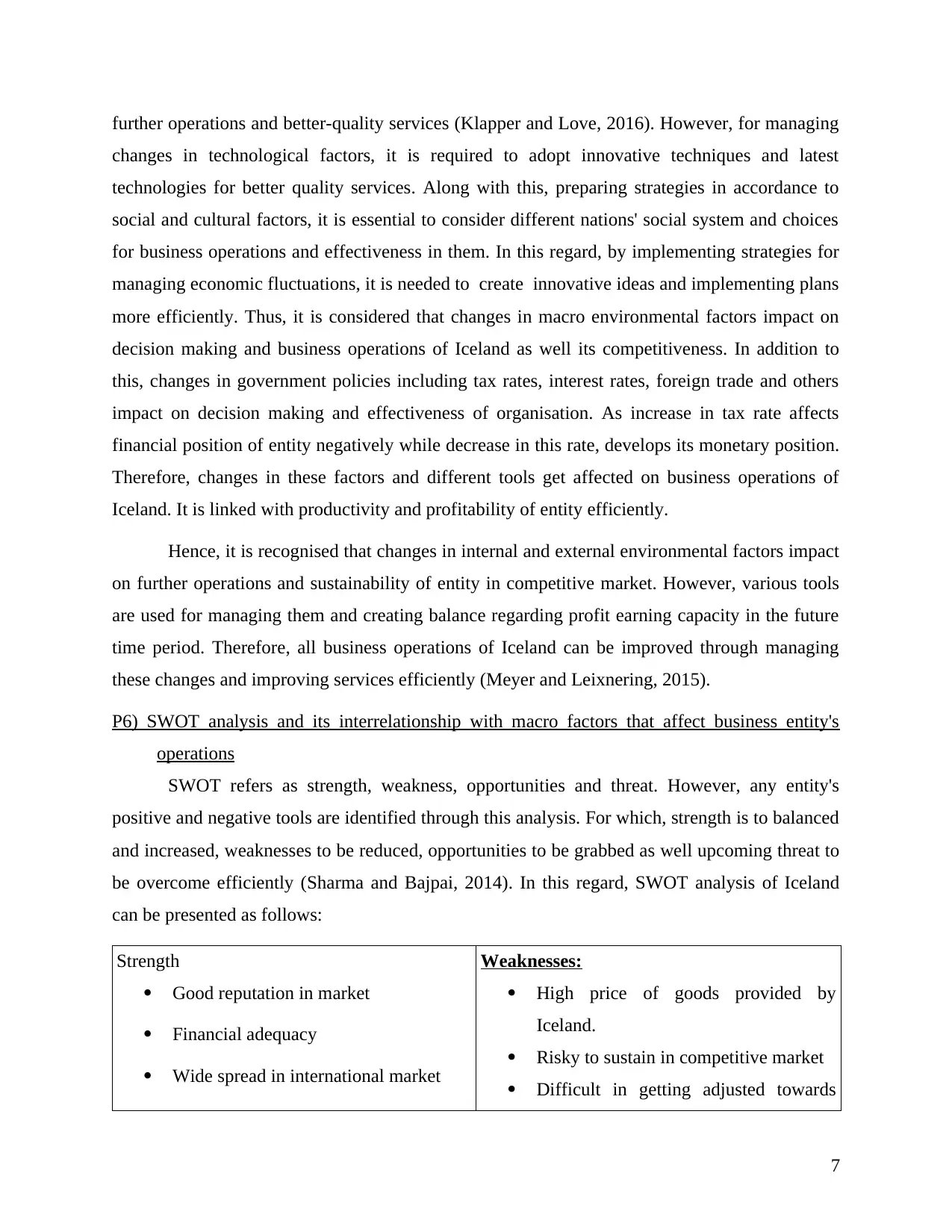
further operations and better-quality services (Klapper and Love, 2016). However, for managing
changes in technological factors, it is required to adopt innovative techniques and latest
technologies for better quality services. Along with this, preparing strategies in accordance to
social and cultural factors, it is essential to consider different nations' social system and choices
for business operations and effectiveness in them. In this regard, by implementing strategies for
managing economic fluctuations, it is needed to create innovative ideas and implementing plans
more efficiently. Thus, it is considered that changes in macro environmental factors impact on
decision making and business operations of Iceland as well its competitiveness. In addition to
this, changes in government policies including tax rates, interest rates, foreign trade and others
impact on decision making and effectiveness of organisation. As increase in tax rate affects
financial position of entity negatively while decrease in this rate, develops its monetary position.
Therefore, changes in these factors and different tools get affected on business operations of
Iceland. It is linked with productivity and profitability of entity efficiently.
Hence, it is recognised that changes in internal and external environmental factors impact
on further operations and sustainability of entity in competitive market. However, various tools
are used for managing them and creating balance regarding profit earning capacity in the future
time period. Therefore, all business operations of Iceland can be improved through managing
these changes and improving services efficiently (Meyer and Leixnering, 2015).
P6) SWOT analysis and its interrelationship with macro factors that affect business entity's
operations
SWOT refers as strength, weakness, opportunities and threat. However, any entity's
positive and negative tools are identified through this analysis. For which, strength is to balanced
and increased, weaknesses to be reduced, opportunities to be grabbed as well upcoming threat to
be overcome efficiently (Sharma and Bajpai, 2014). In this regard, SWOT analysis of Iceland
can be presented as follows:
Strength
Good reputation in market
Financial adequacy
Wide spread in international market
Weaknesses:
High price of goods provided by
Iceland.
Risky to sustain in competitive market
Difficult in getting adjusted towards
7
changes in technological factors, it is required to adopt innovative techniques and latest
technologies for better quality services. Along with this, preparing strategies in accordance to
social and cultural factors, it is essential to consider different nations' social system and choices
for business operations and effectiveness in them. In this regard, by implementing strategies for
managing economic fluctuations, it is needed to create innovative ideas and implementing plans
more efficiently. Thus, it is considered that changes in macro environmental factors impact on
decision making and business operations of Iceland as well its competitiveness. In addition to
this, changes in government policies including tax rates, interest rates, foreign trade and others
impact on decision making and effectiveness of organisation. As increase in tax rate affects
financial position of entity negatively while decrease in this rate, develops its monetary position.
Therefore, changes in these factors and different tools get affected on business operations of
Iceland. It is linked with productivity and profitability of entity efficiently.
Hence, it is recognised that changes in internal and external environmental factors impact
on further operations and sustainability of entity in competitive market. However, various tools
are used for managing them and creating balance regarding profit earning capacity in the future
time period. Therefore, all business operations of Iceland can be improved through managing
these changes and improving services efficiently (Meyer and Leixnering, 2015).
P6) SWOT analysis and its interrelationship with macro factors that affect business entity's
operations
SWOT refers as strength, weakness, opportunities and threat. However, any entity's
positive and negative tools are identified through this analysis. For which, strength is to balanced
and increased, weaknesses to be reduced, opportunities to be grabbed as well upcoming threat to
be overcome efficiently (Sharma and Bajpai, 2014). In this regard, SWOT analysis of Iceland
can be presented as follows:
Strength
Good reputation in market
Financial adequacy
Wide spread in international market
Weaknesses:
High price of goods provided by
Iceland.
Risky to sustain in competitive market
Difficult in getting adjusted towards
7
⊘ This is a preview!⊘
Do you want full access?
Subscribe today to unlock all pages.

Trusted by 1+ million students worldwide
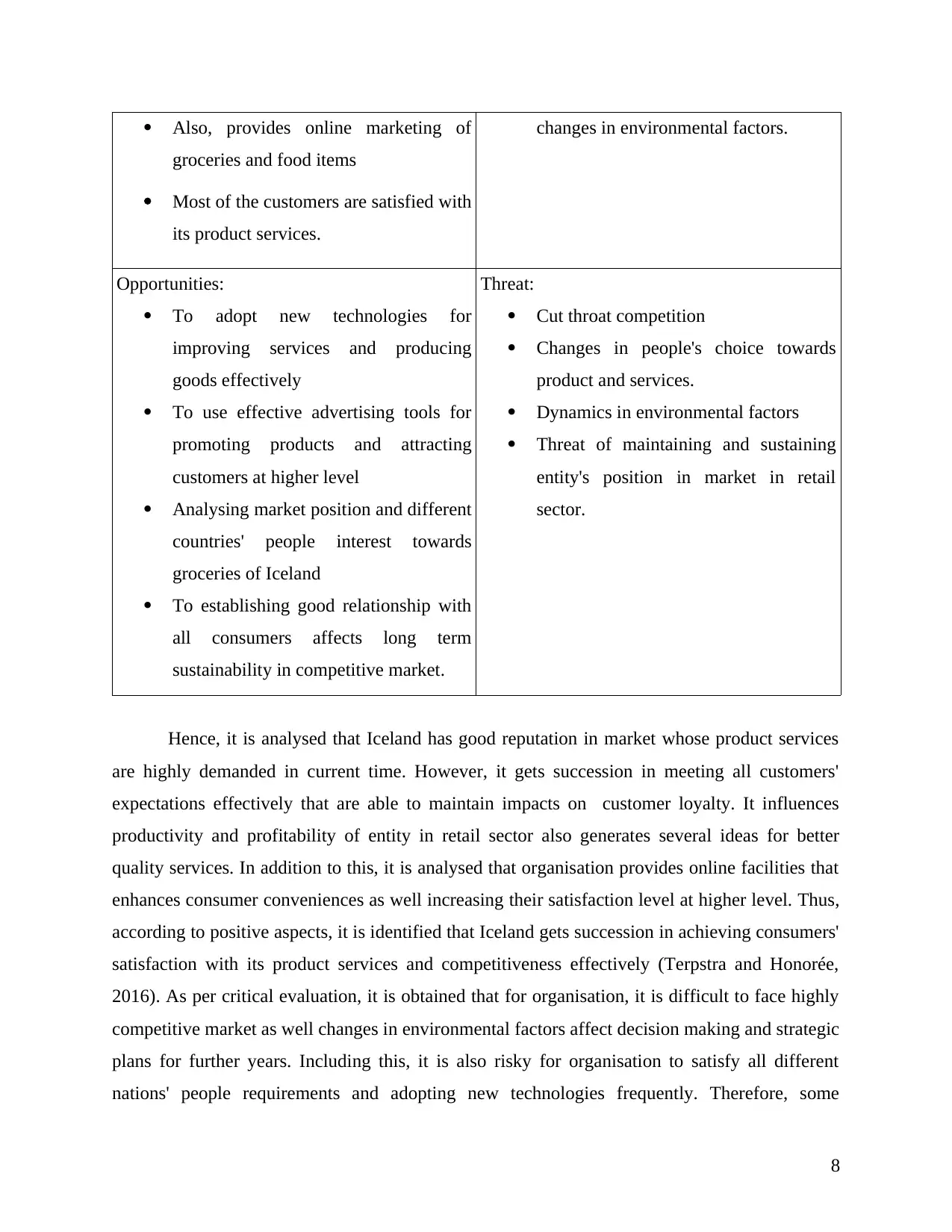
Also, provides online marketing of
groceries and food items
Most of the customers are satisfied with
its product services.
changes in environmental factors.
Opportunities:
To adopt new technologies for
improving services and producing
goods effectively
To use effective advertising tools for
promoting products and attracting
customers at higher level
Analysing market position and different
countries' people interest towards
groceries of Iceland
To establishing good relationship with
all consumers affects long term
sustainability in competitive market.
Threat:
Cut throat competition
Changes in people's choice towards
product and services.
Dynamics in environmental factors
Threat of maintaining and sustaining
entity's position in market in retail
sector.
Hence, it is analysed that Iceland has good reputation in market whose product services
are highly demanded in current time. However, it gets succession in meeting all customers'
expectations effectively that are able to maintain impacts on customer loyalty. It influences
productivity and profitability of entity in retail sector also generates several ideas for better
quality services. In addition to this, it is analysed that organisation provides online facilities that
enhances consumer conveniences as well increasing their satisfaction level at higher level. Thus,
according to positive aspects, it is identified that Iceland gets succession in achieving consumers'
satisfaction with its product services and competitiveness effectively (Terpstra and Honorée,
2016). As per critical evaluation, it is obtained that for organisation, it is difficult to face highly
competitive market as well changes in environmental factors affect decision making and strategic
plans for further years. Including this, it is also risky for organisation to satisfy all different
nations' people requirements and adopting new technologies frequently. Therefore, some
8
groceries and food items
Most of the customers are satisfied with
its product services.
changes in environmental factors.
Opportunities:
To adopt new technologies for
improving services and producing
goods effectively
To use effective advertising tools for
promoting products and attracting
customers at higher level
Analysing market position and different
countries' people interest towards
groceries of Iceland
To establishing good relationship with
all consumers affects long term
sustainability in competitive market.
Threat:
Cut throat competition
Changes in people's choice towards
product and services.
Dynamics in environmental factors
Threat of maintaining and sustaining
entity's position in market in retail
sector.
Hence, it is analysed that Iceland has good reputation in market whose product services
are highly demanded in current time. However, it gets succession in meeting all customers'
expectations effectively that are able to maintain impacts on customer loyalty. It influences
productivity and profitability of entity in retail sector also generates several ideas for better
quality services. In addition to this, it is analysed that organisation provides online facilities that
enhances consumer conveniences as well increasing their satisfaction level at higher level. Thus,
according to positive aspects, it is identified that Iceland gets succession in achieving consumers'
satisfaction with its product services and competitiveness effectively (Terpstra and Honorée,
2016). As per critical evaluation, it is obtained that for organisation, it is difficult to face highly
competitive market as well changes in environmental factors affect decision making and strategic
plans for further years. Including this, it is also risky for organisation to satisfy all different
nations' people requirements and adopting new technologies frequently. Therefore, some
8
Paraphrase This Document
Need a fresh take? Get an instant paraphrase of this document with our AI Paraphraser
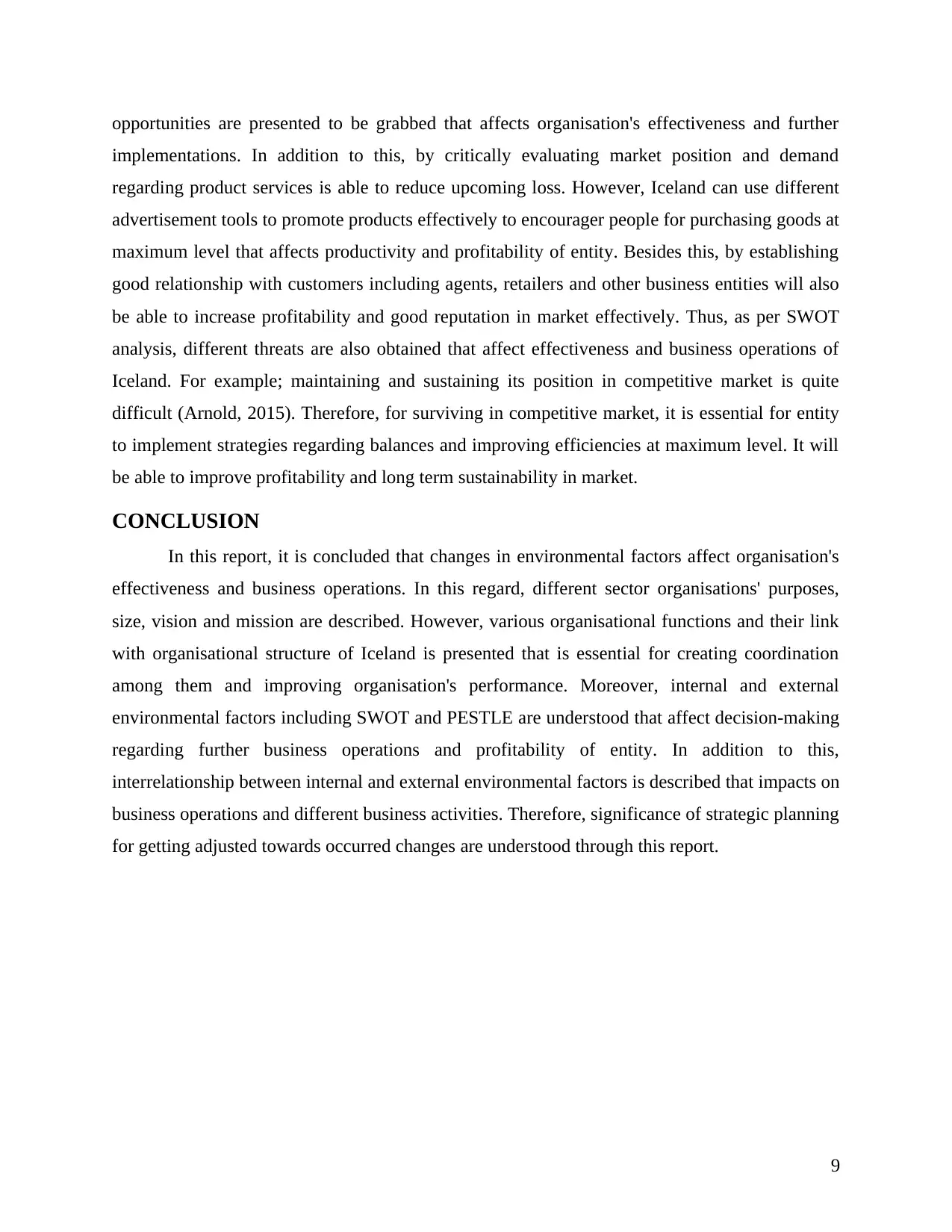
opportunities are presented to be grabbed that affects organisation's effectiveness and further
implementations. In addition to this, by critically evaluating market position and demand
regarding product services is able to reduce upcoming loss. However, Iceland can use different
advertisement tools to promote products effectively to encourager people for purchasing goods at
maximum level that affects productivity and profitability of entity. Besides this, by establishing
good relationship with customers including agents, retailers and other business entities will also
be able to increase profitability and good reputation in market effectively. Thus, as per SWOT
analysis, different threats are also obtained that affect effectiveness and business operations of
Iceland. For example; maintaining and sustaining its position in competitive market is quite
difficult (Arnold, 2015). Therefore, for surviving in competitive market, it is essential for entity
to implement strategies regarding balances and improving efficiencies at maximum level. It will
be able to improve profitability and long term sustainability in market.
CONCLUSION
In this report, it is concluded that changes in environmental factors affect organisation's
effectiveness and business operations. In this regard, different sector organisations' purposes,
size, vision and mission are described. However, various organisational functions and their link
with organisational structure of Iceland is presented that is essential for creating coordination
among them and improving organisation's performance. Moreover, internal and external
environmental factors including SWOT and PESTLE are understood that affect decision-making
regarding further business operations and profitability of entity. In addition to this,
interrelationship between internal and external environmental factors is described that impacts on
business operations and different business activities. Therefore, significance of strategic planning
for getting adjusted towards occurred changes are understood through this report.
9
implementations. In addition to this, by critically evaluating market position and demand
regarding product services is able to reduce upcoming loss. However, Iceland can use different
advertisement tools to promote products effectively to encourager people for purchasing goods at
maximum level that affects productivity and profitability of entity. Besides this, by establishing
good relationship with customers including agents, retailers and other business entities will also
be able to increase profitability and good reputation in market effectively. Thus, as per SWOT
analysis, different threats are also obtained that affect effectiveness and business operations of
Iceland. For example; maintaining and sustaining its position in competitive market is quite
difficult (Arnold, 2015). Therefore, for surviving in competitive market, it is essential for entity
to implement strategies regarding balances and improving efficiencies at maximum level. It will
be able to improve profitability and long term sustainability in market.
CONCLUSION
In this report, it is concluded that changes in environmental factors affect organisation's
effectiveness and business operations. In this regard, different sector organisations' purposes,
size, vision and mission are described. However, various organisational functions and their link
with organisational structure of Iceland is presented that is essential for creating coordination
among them and improving organisation's performance. Moreover, internal and external
environmental factors including SWOT and PESTLE are understood that affect decision-making
regarding further business operations and profitability of entity. In addition to this,
interrelationship between internal and external environmental factors is described that impacts on
business operations and different business activities. Therefore, significance of strategic planning
for getting adjusted towards occurred changes are understood through this report.
9
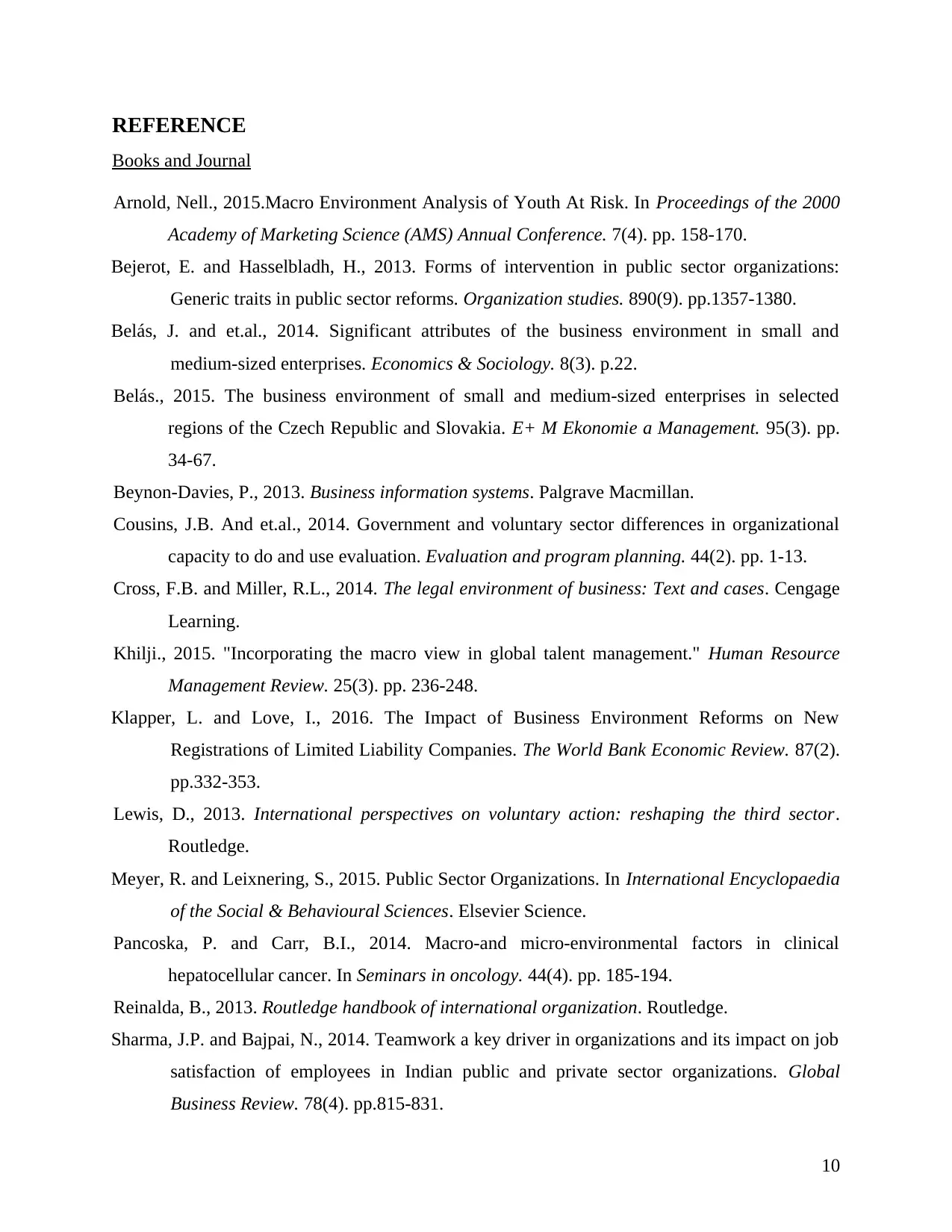
REFERENCE
Books and Journal
Arnold, Nell., 2015.Macro Environment Analysis of Youth At Risk. In Proceedings of the 2000
Academy of Marketing Science (AMS) Annual Conference. 7(4). pp. 158-170.
Bejerot, E. and Hasselbladh, H., 2013. Forms of intervention in public sector organizations:
Generic traits in public sector reforms. Organization studies. 890(9). pp.1357-1380.
Belás, J. and et.al., 2014. Significant attributes of the business environment in small and
medium-sized enterprises. Economics & Sociology. 8(3). p.22.
Belás., 2015. The business environment of small and medium-sized enterprises in selected
regions of the Czech Republic and Slovakia. E+ M Ekonomie a Management. 95(3). pp.
34-67.
Beynon-Davies, P., 2013. Business information systems. Palgrave Macmillan.
Cousins, J.B. And et.al., 2014. Government and voluntary sector differences in organizational
capacity to do and use evaluation. Evaluation and program planning. 44(2). pp. 1-13.
Cross, F.B. and Miller, R.L., 2014. The legal environment of business: Text and cases. Cengage
Learning.
Khilji., 2015. "Incorporating the macro view in global talent management." Human Resource
Management Review. 25(3). pp. 236-248.
Klapper, L. and Love, I., 2016. The Impact of Business Environment Reforms on New
Registrations of Limited Liability Companies. The World Bank Economic Review. 87(2).
pp.332-353.
Lewis, D., 2013. International perspectives on voluntary action: reshaping the third sector.
Routledge.
Meyer, R. and Leixnering, S., 2015. Public Sector Organizations. In International Encyclopaedia
of the Social & Behavioural Sciences. Elsevier Science.
Pancoska, P. and Carr, B.I., 2014. Macro-and micro-environmental factors in clinical
hepatocellular cancer. In Seminars in oncology. 44(4). pp. 185-194.
Reinalda, B., 2013. Routledge handbook of international organization. Routledge.
Sharma, J.P. and Bajpai, N., 2014. Teamwork a key driver in organizations and its impact on job
satisfaction of employees in Indian public and private sector organizations. Global
Business Review. 78(4). pp.815-831.
10
Books and Journal
Arnold, Nell., 2015.Macro Environment Analysis of Youth At Risk. In Proceedings of the 2000
Academy of Marketing Science (AMS) Annual Conference. 7(4). pp. 158-170.
Bejerot, E. and Hasselbladh, H., 2013. Forms of intervention in public sector organizations:
Generic traits in public sector reforms. Organization studies. 890(9). pp.1357-1380.
Belás, J. and et.al., 2014. Significant attributes of the business environment in small and
medium-sized enterprises. Economics & Sociology. 8(3). p.22.
Belás., 2015. The business environment of small and medium-sized enterprises in selected
regions of the Czech Republic and Slovakia. E+ M Ekonomie a Management. 95(3). pp.
34-67.
Beynon-Davies, P., 2013. Business information systems. Palgrave Macmillan.
Cousins, J.B. And et.al., 2014. Government and voluntary sector differences in organizational
capacity to do and use evaluation. Evaluation and program planning. 44(2). pp. 1-13.
Cross, F.B. and Miller, R.L., 2014. The legal environment of business: Text and cases. Cengage
Learning.
Khilji., 2015. "Incorporating the macro view in global talent management." Human Resource
Management Review. 25(3). pp. 236-248.
Klapper, L. and Love, I., 2016. The Impact of Business Environment Reforms on New
Registrations of Limited Liability Companies. The World Bank Economic Review. 87(2).
pp.332-353.
Lewis, D., 2013. International perspectives on voluntary action: reshaping the third sector.
Routledge.
Meyer, R. and Leixnering, S., 2015. Public Sector Organizations. In International Encyclopaedia
of the Social & Behavioural Sciences. Elsevier Science.
Pancoska, P. and Carr, B.I., 2014. Macro-and micro-environmental factors in clinical
hepatocellular cancer. In Seminars in oncology. 44(4). pp. 185-194.
Reinalda, B., 2013. Routledge handbook of international organization. Routledge.
Sharma, J.P. and Bajpai, N., 2014. Teamwork a key driver in organizations and its impact on job
satisfaction of employees in Indian public and private sector organizations. Global
Business Review. 78(4). pp.815-831.
10
⊘ This is a preview!⊘
Do you want full access?
Subscribe today to unlock all pages.

Trusted by 1+ million students worldwide
1 out of 13
Related Documents
Your All-in-One AI-Powered Toolkit for Academic Success.
+13062052269
info@desklib.com
Available 24*7 on WhatsApp / Email
![[object Object]](/_next/static/media/star-bottom.7253800d.svg)
Unlock your academic potential
Copyright © 2020–2026 A2Z Services. All Rights Reserved. Developed and managed by ZUCOL.





